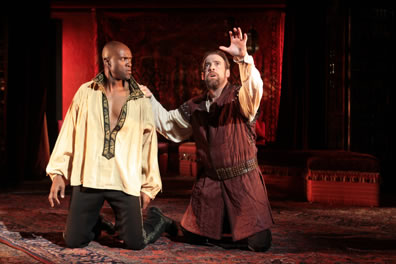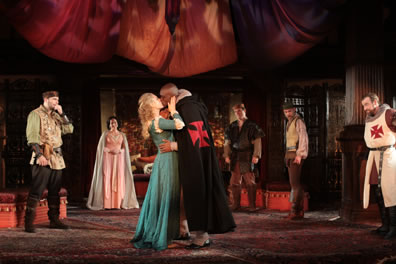Othello
It May Be Iago’s Play,
But Othello’s Tragedy Runs Deep
Folger Theatre, Washington, D.C.
Wednesday, November 2, 2011, E–13&15 (left stalls)
Directed by Robert Richmond
After a prelude of balletic lovemaking between Othello and, presumably, Desdemona behind an opaque curtain surrounding a bed in the middle of the Folger stage, Iago walked up the center aisle through the audience, stopped on the steps leading up to the stage, watched the lovers a moment, then turned to the audience and spoke the production’s first lines: “I hate the Moor.” Iago also had the production’s last line, as it were. With the mayhem of Cyprus littering the stage, Iago, perched on the steps again, turned to the audience with a sneering chuckle.

Owiso Odera as Othello, left, and Ian Merrill Peakes as Iago in the Folger Theatre's production of Shakespeare's Othello. The chemistry between the two actors sharpened the action and drove the plot in the middle scenes. Photo by Carol Pratt, Folger Theatre.
As both these moments required significant cuts and shuffling of the text (the Venetian scenes, unfortunately, were shuffled into a confusing hodge-podge of a narrative) this was clearly Iago’s play and director Robert Richmond was making the case that Iago is us. We, by being silent observers of what he does and even laughing at his jokes, are at least complicit in his evil behavior. Ian Merrill Peakes went beyond making Iago charming. His Iago was our compadre. We’ve seen this fine actor give us a sympathetic Angelo in Measure for Measure and a full-spectrum King Henry in Henry VIII, and now here was an Iago he made so affable we didn’t mind seeing how far he would go to gull Roderigo (a silly sot in Louis Butelli’s portrayal) and take down Cassio (Thomas Keegan as a hot-shot officer with little respect for others below his rank).
Furthermore, as Peakes made Iago’s primary motivation the rumor that Othello has had an affair with his wife, Emilia, we the audience were even OK with his plot against Othello, at least up until he told the Moor that rather than poisoning Desdemona he should “strangle her in her bed, even the bed she hath contaminated.” It was a lightning bolt moment in this production as the hitherto raving, raging Othello suddenly settled into total calm: “Good, good,” he said with the assurance of a general hearing a strategy that bodes well. “The justice of it pleases. Very good.” With that, just as Iago had attained Othello’s full confidence, we, the audience, were going, “Um, wait a minute.” Too late: the tragedy we helped set on was inexorably heading toward its grisly end.
In order for that psychological shift to sufficiently punch our gut, much credit goes to Owiso Odera in the title role. This production may have been trying to turn “The Tragedy of Othello, The Moor of Venice” into “The Tragedy Wrought by Iago, The Venetian in Cyprus,” but Odera’s performance dominated the play, even when Peakes was on stage. A true physical specimen, Odera’s Othello was animated by the wonders of the world, a grown man—veteran warrior, even—with all the innocence of a child waking up on Christmas morning. When his most stunning gift of all, Desdemona, turned out to be broken, it shattered his sense of innocence and broke him, too. Set in the 13th Century Crusades, this was a world of black and white, figuratively at least (but not visually, as Tony Cisek’s set was a Turkish palace room for the Cyprus scenes with burgundy ottomans, ornate tapestries, and latticed screens, and jeweled fixtures in contrast to the Knights Templer austerity of the Venetian court). Except for Emilia, no character—Othello most tragically—knew how to navigate the gray spaces of ideology and morality.
Yet, there was a hint of something else, whether intended by Richmond and Odera or not: evidence that Othello may have been suffering from post-traumatic stress disorder. In the opening scenes he describes wooing Desdemona with tales of his trials in combat and “some distressful stroke that my youth suffered,” which prompted both pity and adoration in the woman. That came across as so romantic even The Duke (Todd Scofield) smiled at it: “I think this tale would win my daughter, too,” was spoken so genuinely it induced a laugh from the audience. At play’s end, though, after we had seen him inexplicably rage into an extreme of jealousy so against his previous demeanor, Othello recalled yet another horrific moment of combat from his past, and then he stabbed himself. The connection between what he had previously seen and suffered and how he now behaved was palpable.
As commanding as both Odera and Peakes were in their individual performances, it was their combined performance that stood out most. The chemistry between the two sharpened the action and drove the plot in the middle scenes. What Fey and Baldwin are to sketch comedy, Peakes and Odera were to dramatic acting, a furious repartee of words, gestures, facial expressions, movements, and physical violence. I’ve slept through those middle scenes when performed by two of the world’s greatest Shakespearean actors; but on this evening, after a tiresomely frustrating day and made more groggy by way too much chips and salsa at a Mexican restaurant, I sat riveted to Odera and Peakes navigate their intense tête-à-tête.

Janie Brookshire as Desdemona and Owiso Odera as Othello kiss as other characters look on: from left, Chris Genebach as Montano, Karen Peakes as Emilia, Todd Scofield as a Cypriot, Louis Butelli as Roderigo, and Ian Merrill Peakes as Iago. Photo by Carol Pratt, Folger Theatre.
Janie Brookshire provided no significant shadings to her Desdemona (no flirtatiousness, no naiveté). What she did provide was a woman whose mere radiant appearance made men’s knees weak, and whose wholesome vitality and constant good humor made all men dote on her (not just Roderigo, but Cassio, too, and even Iago got caught up in her spell a couple of times). In a deeply talented company, another performance that stood out was Chris Genebach’s Montano, who, with both his good nature and his stout sense of duty, was the friend that made both Othello and Iago remember their previous time in Cyprus with fondness.
Emilia is perhaps Othello’s most difficult role because her part shows Iago’s domestic side, but the text gives conflicting views of that relationship. Is he henpecked? Is she abused? Do they love or despise each other? Or has a one-time romance simply gone stale? Peakes and his real-life wife, Karen Peakes, erected an emotional wall between their characters. When she told him about finding the handkerchief she did so with sexual teasing; he responded distantly at first, but then manhandled her physically, hinting at a marriage that had endured some violence in the past. However, what more informed their relationship was Emilia mentioning late in the play the rumor that she had slept with Othello. “Some such squire he was that turned your wit the seamy side without and made you to suspect me with the Moor,” she said to Iago, to which he dismissively replied “You are a fool: go to.” True or false, the rumor of that affair was a crisis in the marriage the two apparently have not put behind them. With that as the wall wedged between them, it would explain why Emilia was so desperate to break through to her husband that she turned Desdemona’s treasured handkerchief over to Iago despite her misgivings.
Then again, Emilia endorses wives cheating on their husbands “for all the world,” though not for petty things like gowns or caps. In Karen Peakes’ delivery of this speech, I realized that Shakespeare has Emilia advocating for women’s rights the same way he has Shylock advocating for Jews’ enfranchisement in his “hath not a Jew” speech in The Merchant of Venice. The argument is the same, too. “Have not we affections? Desires for sport? And frailty, as men have?” Emilia asks. “Then let them use us well: else let them know, the ills we do, their ills instruct us so.”
Desdemona will not have any of it. She doesn’t wish to pick “bad from bad, but by bad mend.” But some bad just won’t be mended. And some bad is by forces greater than any man can comprehend simply unable to mend. Desdemona dies at the hands of both.
Eric Minton
November 4, 2011
Comment: e-mail editorial@shakespeareances.com
Start a discussion in the Bardroom



 Find additional Shakespeareances
Find additional Shakespeareances